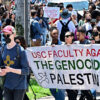There is no single formula for overcoming challenges to economic development and maintaining economic dynamism, but one thing is clear: Around the globe, governments that respect and promote economic freedom provide greater opportunities for innovation, progress and human empowerment. The 2015 Index of Economic Freedom, released today, tracks policy developments affecting economic freedom across the world by looking at four primary areas: rule of law (property rights, freedom from corruption), government size (fiscal freedom, government spending), regulatory efficiency (business freedom, labor freedom, and monetary freedom), and market openness (trade freedom, investment freedom, financial freedom).
Here are five key points you should take away from this year’s Index:
- The United States continues to be only the 12th-freest economy, seemingly stuck in the ranks of the “mostly free,” trailing such comparable economies as Australia, New Zealand and Switzerland. Although the downward spiral in U.S. economic freedom since 2008 has come to a halt with modest gains in six of the 10 economic freedoms, the 1.6-point decline in overall economic freedom over the past five years reflects broad-based deteriorations in key policy areas. Increased tax and regulatory burdens, aggravated by favoritism toward entrenched interests, have undercut America’s historically dynamic entrepreneurial growth. As Americans more than ever look to their future with growing frustration, 2015 should be the year of action to put America back on the path to freedom and revitalize its entrepreneurial pulse.
- The global average economic freedom score has advanced to its highest level ever. Despite the continuing challenges that confront the world economy, the global average economic freedom score has improved over the past year by one-tenth of a point, reaching a record 60.4 (on a 0-to-100 scale) in the 2015 Index. Although the rate of advancement has slowed in comparison to last year’s near record 0.7-point increase, the world average has now reached a level a full point higher than that recorded in the aftermath of the financial crisis and recession.
- 101 countries, the majority of which are less developed or emerging economies, showed advances in economic freedom over the past year. 37 countries, including Taiwan, Lithuania, Georgia, Colombia, Israel, Cabo Verde, Montenegro and Côte d’Ivoire, achieved their highest economic freedom scores ever in the 2015 Index.
- Competition for the top spot in the Index rankings has intensified more than ever. The 2015 Index has recorded a number of noticeable realignments and achievements within the top 20 global economic freedom rankings. For example, although Hong Kong has maintained its status as the world’s freest economy, a distinction that it has achieved for 21 consecutive years, the gap between that territory and Singapore, the second-freest economy, has further vanished.
- Countries with higher levels of economic freedom continue to outperform others in reducing poverty, achieving greater prosperity, and ensuring broader progress in many dimensions of social and human development. As the Index has catalogued, nations with higher degrees of economic freedom prosper because they capitalize more fully on the ability of the free-market system not only to generate, but also to reinforce dynamic growth through efficient resource allocation, value creation and innovation. Policies that promote freedom, whether through improvements in the rule of law, the promotion of competition and openness, or suitable restraints on the size and economic reach of government, turn out in practice to advance practical solutions to a wide range of economic and social challenges.
A recurring theme of human history has been resilience and revival. The country profiles in the 2015 Index of Economic Freedom include many examples of countries that have accelerated their economic and social progress in the face of difficult challenges and a sometimes harsh international environment. Their successes can be emulated by others. The Index charts not just one path to development, but as many as the ingenuity of humans can produce when they are free to experiment and innovate.
The 21st edition of the Index of Economic Freedom assesses economic policy developments in 186 economies in six regions around the world. Since its inception in 1995, the Index, an annual cross-country analysis by The Heritage Foundation, in collaboration with The Wall Street Journal, has tracked the progress of economic freedom and measured the impact of advancing economic liberty around the globe.
Find and learn more about the critical interplay between economic freedom, opportunity, and empowerment at www.heritage.org/Index.




























